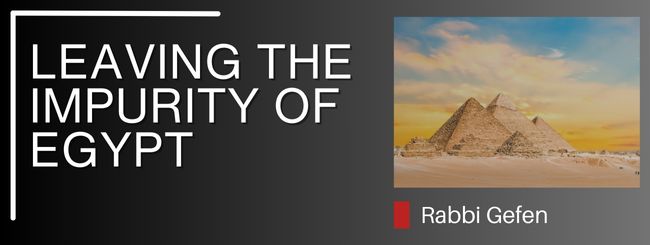Tazria (Leviticus 12-13 )
On Passover we celebrate the Exodus from Egypt, yet even after leaving Egypt, the dangers of being affected by that corrupt nation remained very real. Accordingly, the Torah commands us: “Do not perform the practices of the land of Egypt in which you dwelled…1” Rashi writes that Egypt was the most morally decadent nation and in particular the parts in which the Jews dwelled were the worst sections of these countries. Why did G-d deliberately place the Jewish people in the most corrupt place on Earth?2
Rabbi Eliyahu Dessler3 observes that negative society can have a very detrimental effect on a person. However, if he is strong enough so that the negative influences do not affect him, then it can actually strengthen him in his spiritual development. Faced with the surrounding evil, he strengthens his appreciation of good. Rav Dessler says this explains why G-d deliberately placed the Jewish people in the most degenerate places on Earth. “Every time where there was a necessity for a righteous person to rise to an extremely high level that person was flung into the most lowly and degenerate environments so that he could learn from them the lowliness of evil and strengthen himself in good to the opposite extreme.4”
G-d deliberately placed the Jewish people in Egypt so that they could develop an intense hatred of its impurity which, he writes, was indeed their motivation for crying out to G-d to free them from this terrible place. This intense disgust enabled them to rapidly rise from being on the 49th level of impurity to reaching the level of being able to receive the Torah. Had they found themselves in a less immoral environment then they would not have been able to rise to such a high level.
This too would seem to explain why the Jewish people had to go to a similarly abhorrent land, that of Canaan. Seeing the highly immoral behavior of the Canaanite nations was intended to intensify their disgust at evil and in turn, heighten their appreciation of Torah morality5.
Rabbi Dessler’s principle helps us understand some important aspects of Passover. We begin the Haggadah discussing our ancestors who worshipped idols. Rav Dessler asks, how is this connected to the story of leaving Egypt? He answers that through being surrounded by such negativity, Avraham rose to such a high level of holiness to the extent that its power would never be nullified. The redemption from Egypt sprouted directly from this holiness. Therefore, we talk about our idol-worshipping ancestors to highlight that it was directly as a result of their impurity that Avraham emerged to reach such an incredibly high level and it was his greatness in turn that planted the seeds for the Exodus from Egypt.
We can now gain a deeper understanding of why the Haggadah goes to considerable lengths to discuss the negative influences that include our idol-worshipping ancestors, the Egyptians and Lavan. Perhaps this is intended to arouse our disgust at such immoral people and in turn, heighten our appreciation of G-d for freeing us from them and giving us the Torah.
In today’s world, the test of deleterious influences is unavoidable. It is of course highly advisable to strive to reduce their influence as much as possible but nonetheless it is impossible to completely eliminate any exposure to them. Rabbi Dessler’s principle can help us deal with these influences and perhaps even use them for the good.
By Rabbi Yehonasan Gefen
Notes
- Acharei Mts, 18:3.
- The only other nation that seemed to rival Egypt’s immorality was that of Canaan.
- Michtav M’Eliyahu, 1st Volume, p.157-160
- Ibid. p.158.
- Of course, the Jewish people had free will as to whether they chose to completely reject the ways of the Canaanites or to accept them as neighbors and thereby be influenced negatively. History shows that they did not completely destroy their neighbors and in time they came to be negatively influenced by the Canaanites.
WEEKLY TORAH PORTION,
© Copyright, all rights reserved. If you enjoyed this article, we encourage you to distribute it further.
Our blogs may contain text/quotes/references/links that include copyright material of Mechon-Mamre.org, Aish.com, Sefaria.org, Chabad.org, and/or AskNoah.org, which we use in accordance with their policies.
